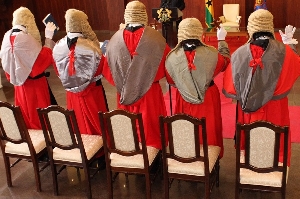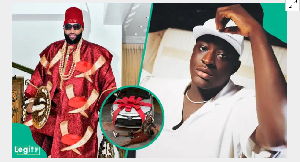The just ended 2010 Soccer World Cup Tournament in South Africa will go down in the annals of World Cup Soccer history as one of abject abysmal performance by certain soccer stalwarts as England, France, Italy and to an extent Brazil and Argentina, and signs of hope for a blissful tomorrow for countries such as Switzerland and the USA. But for Ghana’s inspiring performance that of the rest of Africa’s participants could best be described as atrocious, and that will be a topic for discussion in a different piece at a later date.
Ghana stood tall in the face of outright disappointment and disgrace and salvaged the image of a continent that was hosting its first World Cup by almost advancing to the semi-final stage of the competition but for the unheralded or heralded (depending on which country one is from) hand of Luis Suarez from Uruguay. Ghana chalked similar success as its predecessors Cameroon (1984) and Senegal (2002) and was wondering aloud whether Africa’s best since the past two decades equated to a cyclicity of reaching the quarter final stage every other tournament.
Ghana’s soccer prowess and quite scintillating performance gives me more than a glimmer of hope that with effective leadership, proper planning, vision, focus and preparation this seemingly cyclical occurrence could be made an aberration rather than the norm by our indefatigable Black Stars. There is an apothegm which states “if you fail to plan you plan to fail” and therefore it behoves on those at the helm of soccer administration to have an honest and unbiased assessment and evaluation of every facet of our participation in the competition (personnel, technical, administrative, psychological etc.) and to take a holistic approach in mapping out pragmatic measures that will ensure not only our participation in Brazil 2014 but winning the ultimate and once again championing the way for Africa. Soccer is gradually evolving to a stage where there are no longer soccer minnows or teams that will kowtow to another based on past glory or names, and as such every success must be earned. We are on the path of ascendancy into recognition and prominence and only we can harm ourselves, and therefore should guard against complacency and high-headedness. To this end we should start working on Brazil 2014 and beyond now so that we can effectively maximize our efforts and chances, and revel in our success as the first African nation to win the World Cup.
From a personal standpoint I have little or no qualms about our overall performance because we performed creditably by all standards but am a firm believer in the principle that no visionary does his/her best at any point in time and that one should always strive assiduously to exceed his/her expectations or better still improve upon his/her achievements. The following suggestions are not in themselves mutually exclusive but pointers methinks when given much credence and implemented will see our vision and goal of becoming World Soccer Champions a reality rather than a mirage.
First, preparation for Brazil 2014 and beyond should start now with the setting up of an independent committee to come out with findings of what transpired before, during and after the games to see which areas need sustaining, enhancing or overhauling, and should encompass everything from technical, administrative, personnel to organizational strategy. This might sound a redundant idea but without knowing where you’ve been and where you are there’s no way you can effectively map out strategies for where you’re headed. The Committee should be given the adequate resources and freedom to do their work and their findings should not be shelved to pick up dust as is normally the case but leadership should study the report intoto and put in place modalities for implementing the recommendations for effective maximization.
The next issue of prime concern is the ever-present-never-resolved problem of a lack of potent strikers. In the 2006 World Cup that need became quite apparent and four years later (2010) we encountered the same problem which begs the question if anything at all was done to rectify that problem. We cannot manufacture strikers but with effective scouting and better branding we will be able to discover talents (strikers) and provide incentive for Ghanaian players in the diaspora to opt to play for Ghana. We cannot afford to go to Brazil 2014 with Asamoah Gyan once again as the only option upfront. Whoever was or were the reserve strikers should also take it upon themselves as a challenge to make personal commitments to hone their skills and enhance their game so they can be effectively and efficiently utilized for national and personal gratification. Regarding the other positions I think we have a bright future ahead and will need not much tweaking. The Appiah’s, Mensah’s, Kingston’s, Sarpei’s etc. would have aged (used advisedly) by 2014 and would need to be replaced or the Lee Addy’s, Jonathan Mensah’s etc. should be encouraged and propped up to take over the mantle.
Regarding the technical staff I think they did a yeoman’s job and should be highly commended for that. There is a saying in America that “if it ain’t broke don’t fix it” so the technical team should be maintained and given the necessary resources and responsibilities for effective player scouting and development. I understand coach Rajevac communicates through a translator and if that’s true then concerted efforts should be made to get him up to speed with the English Language through specialized classes (Rosetta Stone could also be helpful) because words or meanings could be lost in translation thus the need to have direct communication channels with the players.
One other area of immense relevance that needs rapt attention is the mental and/or psychological fortitude of our players or teams. The pendulum swing in confidence levels when we play the Germany’s, Brazil’s etc. as opposed to the Serbia’s, USA’s is astoundingly perplexing. Against the perceived less formidable teams we display overconfidence and against the so called greats we recoil into a state of mental cowardice. The boys should be mentally trained to maintain an even keel of confidence regardless of the opposition but even where there might be variations it shouldn’t be so disparagingly luculent as to impair their mental psyche. I will therefore suggest that during tournaments of such nature the services of a psychologist (preferably sports psychologist) should be secured to assist the boys in their mental preparation and attitude towards games.
Leadership should also do well to communicate their vision to the boys in unequivocal terms and ensure that they buy into it. Without all parties being on the same page and fighting towards a common realization our efforts at winning the World Cup will forever become elusive. Regarding skill set, soccer IQ and physique we are at par with any top soccer nation but we need to work on a few knotty points and Ghana will once again become the pacesetter in taking Africa to the “Promised land” (winning the World Cup).
On a less weightier note why do our players put themselves to ridicule by giving comments or remarks in English when they’re somewhat orally deficient? Though we are an English speaking country it is common knowledge that the level of English proficiency of these boys is close to godawful. Just like the French, Germans, Spaniards etc. let’s do the honourable thing in speaking the language we’re good at and leaving the translation to the experts to do their work. Thanks so much John Mensah for your message on “Saying No to Raseezim” (Saying No to Racism) but in the future please do as the Uruguayan did by speaking in Twi and letting FIFA’s paid translator do his/her work.
Carl Owusu-Barnes (Maryland, USA).
Sports Features of Friday, 23 July 2010
Source: Owusu-Barnes, Carl












